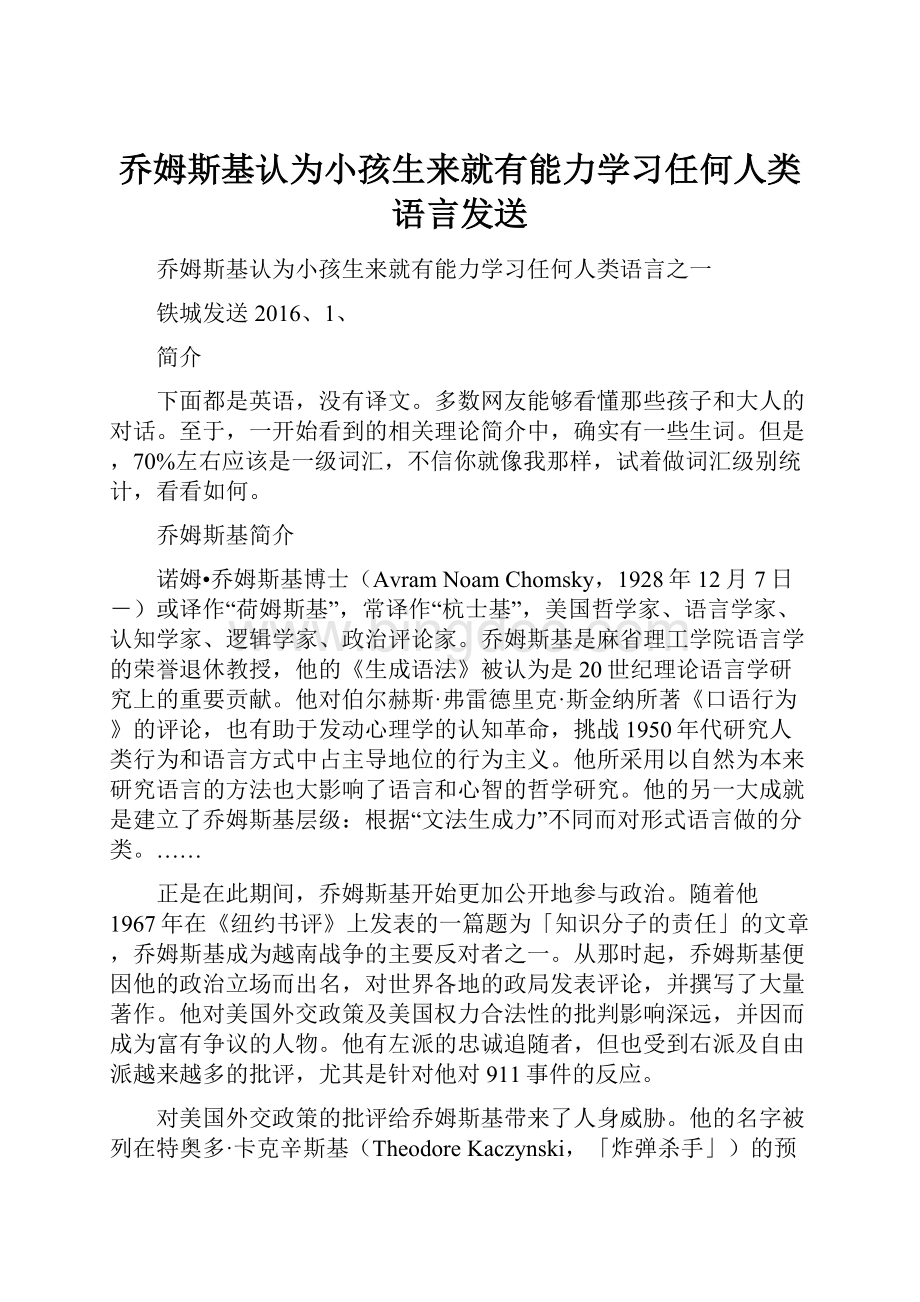乔姆斯基认为小孩生来就有能力学习任何人类语言发送.docx
《乔姆斯基认为小孩生来就有能力学习任何人类语言发送.docx》由会员分享,可在线阅读,更多相关《乔姆斯基认为小孩生来就有能力学习任何人类语言发送.docx(16页珍藏版)》请在冰点文库上搜索。

乔姆斯基认为小孩生来就有能力学习任何人类语言发送
乔姆斯基认为小孩生来就有能力学习任何人类语言之一
铁城发送2016、1、
简介
下面都是英语,没有译文。
多数网友能够看懂那些孩子和大人的对话。
至于,一开始看到的相关理论简介中,确实有一些生词。
但是,70%左右应该是一级词汇,不信你就像我那样,试着做词汇级别统计,看看如何。
乔姆斯基简介
诺姆•乔姆斯基博士(Avram Noam Chomsky,1928年12月7日-)或译作“荷姆斯基”,常译作“杭士基”,美国哲学家、语言学家、认知学家、逻辑学家、政治评论家。
乔姆斯基是麻省理工学院语言学的荣誉退休教授,他的《生成语法》被认为是20世纪理论语言学研究上的重要贡献。
他对伯尔赫斯·弗雷德里克·斯金纳所著《口语行为》的评论,也有助于发动心理学的认知革命,挑战1950年代研究人类行为和语言方式中占主导地位的行为主义。
他所采用以自然为本来研究语言的方法也大影响了语言和心智的哲学研究。
他的另一大成就是建立了乔姆斯基层级:
根据“文法生成力”不同而对形式语言做的分类。
……
正是在此期间,乔姆斯基开始更加公开地参与政治。
随着他1967年在《纽约书评》上发表的一篇题为「知识分子的责任」的文章,乔姆斯基成为越南战争的主要反对者之一。
从那时起,乔姆斯基便因他的政治立场而出名,对世界各地的政局发表评论,并撰写了大量著作。
他对美国外交政策及美国权力合法性的批判影响深远,并因而成为富有争议的人物。
他有左派的忠诚追随者,但也受到右派及自由派越来越多的批评,尤其是针对他对911事件的反应。
对美国外交政策的批评给乔姆斯基带来了人身威胁。
他的名字被列在特奥多·卡克辛斯基(TheodoreKaczynski,「炸弹杀手」)的预定上。
在卡氏被捕以前,乔姆斯基让人检查收到的以防炸弹。
他自称也经常被警察保护,特别是在麻省理工校园的时候,虽然他本人原则上不同意这种保护。
尽管对美国百般批评,乔姆斯基还是生活在美国。
他的解释是:
美国仍然是世界上最伟大的国家。
后来他又阐发为:
「国与国之间的综合比较没有什么意义,我也不会这么比较。
不过美国有些成就,特别是在言论自由方面几个世纪来争得的领先地位,是值得敬仰的。
”
※※※※※※※※
Chomskybelieveschildrenarebornwithanabilitytolearnanyhumanlanguage.
iloveenglishlanguage
4.1childlanguageacquisitiontheory–chomsky,crystal,Aitchison& piaget
Chomsky
NoamChomskybelievesthatchildrenarebornwithaninheritedabilitytolearnanyhumanlanguage.Heclaimsthatcertainlinguisticstructureswhichchildrenusesoaccuratelymustbealreadyimprintedonthechild’smind.Chomskybelievesthateverychildhasa‘languageacquisitiondevice’orLADwhichencodesthemajorprinciplesofalanguageanditsgrammaticalstructuresintothechild’sbrain.ChildrenhavethenonlytolearnnewvocabularyandapplythesyntacticstructuresfromtheLADtoformsentences.Chomskypointsoutthatachildcouldnotpossiblylearnalanguagethroughimitationalonebecausethelanguagespokenaroundthemishighlyirregular–adult’sspeechisoftenbrokenupandevensometimesungrammatical.Chomsky’stheoryappliestoalllanguagesastheyallcontainnouns,verbs,consonantsandvowelsandchildrenappeartobe‘hard-wired’toacquirethegrammar.Everylanguageisextremelycomplex,oftenwithsubtledistinctionswhichevennativespeakersareunawareof.However,allchildren,regardlessoftheirintellectualability,becomefluentintheirnativelanguagewithinfiveorsixyears.
EvidencetosupportChomsky’stheory
∙Childrenlearningtospeaknevermakegrammaticalerrorssuchasgettingtheirsubjects,verbsandobjectsinthewrongorder.
∙Ifanadultdeliberatelysaidagrammaticallyincorrectsentence,thechildwouldnotice.
∙Childrenoftensaythingsthatareungrammaticalsuchas‘mamaball’,whichtheycannothavelearntpassively.
∙Mistakessuchas‘Idrawed’insteadof‘Idrew’showtheyarenotlearningthroughimitationalone.
∙Chomskyusedthesentence‘colourlessgreenideassleepfuriously’,whichisgrammaticalalthoughitdoesn’tmakesense,toprovehistheory:
hesaiditshowsthatsentencescanbegrammaticalwithouthavinganymeaning,thatwecantellthedifferencebetweenagrammaticalandanungrammaticalsentencewithouteverhavingheardthesentencebefore,andthatwecanproduceandunderstandbrandnewsentencesthatnoonehaseversaidbefore.
EvidenceagainstChomsky’stheory
∙CriticsofChomsky’stheorysaythatalthoughitisclearthatchildrendon’tlearnlanguagethroughimitationalone,thisdoesnotprovethattheymusthaveanLAD –languagelearningcouldmerelybethroughgenerallearningandunderstandingabilitiesandinteractionswithotherpeople.
Dialogue–
ParentandChild(3yearsold)
Parent:
Whatdidyoudotoday?
Child:
Medrawedacat.(applies–edsuffixrulebutgetswrong)
Parent:
Youdrewacat?
Child:
Yeah.(understandscorrection)
Parent:
Whodidyouplaywithatbreaktime?
Child:
MeplayedwithSarahandHelen.(wrongpronoun–notlearntpassively)
Parent:
Thatsoundfun.Nowwhatdoyouwantfortea?
Child:
Dunno.Whatyouhaving?
Parent:
DaddyandIarehavingfish.
Child:
Youhavingfishes?
(incorrectuseofpluralnounbutshowschildapplyingrules)
Parent:
Yes.I’lldoyousomefishfingersandifyou’reagoodgirlandeat themallyoucanhaveasweetie.(applyingpluralnounrule)
Child:
Mewanttwosweeties.
Parent:
Alrightthen.NowgoandwatchPostmanPatwhileIstartthetea.
Child:
WhenDaddycominghome?
(getsSVOordercorrectallthetime)
Parent:
He’llbeheresoon.
David Crystal
DavidCrystal’sTheoryOnChildLanguageAcquisition
ProfessorCrystalisbestknownforhistwoencyclopaediasTheCambridgeEncyclopaediaofLanguageandTheCambridgeEncyclopaediaoftheEnglishLanguage.Sowhatdoesthishavetodowithchildlanguageacquisition?
DavidCrystalhasthetheorythatchildrenlearnlanguageinfivestages,whicharen’tclearlydefinedandsometieinwitheachother.
Thesestagesare:
StageOne:
Thisiswherechildrensaythingsforthreepurposes:
1.Togetsomethingtheywant
2.Togetsomeone’sattention
3.Todrawattentiontosomething
Thentheybegintomakebasicstatementssuchas“daddycar”
Duringthisstagechildrenbeginnamingthingswithsinglewordsandthenmoveontorelatingobjectswithotherthings,placesandpeople,forexample,“theremummy”.Theyalsorelateobjectswithevents,forexample,“birdgone”.
Atthisearlystagetheydon’thavemuchvocabularysotheyuseintonationtoaskaquestion.Childrenusewordslike:
“there,wantandallgone”toexpressafullsentence.Thiscouldbesaidthatpartofthisstageisholophrastic.
StageTwo:
Thisiswhenchildrenusuallyaskquestions,“where”questionscomefirst.Theirquestionsoftenbeginwithinterrogativepronouns(what,where)followedbyanounorverbsuchas“wheregone?
”
Childrenbecomeconcernedwithnamingandclassifyingthingsbyfrequentlyasking“Wassat?
”Theymayalsobegintotalkaboutthecharacteristicsofthingsforexample:
big/small.Childrenaretaughttolearnthingsinoppositepairssuchasup/downandhot/cold.
StageThree:
Bynowchildrenwouldbeaskinglotsofdifferentquestionsbutoftensignallingthattheyarequestionswithintonationalone,forexample:
“Sallyplayingardenmummy?
”Thisismadeintoaquestionbyvaryingthetoneofvoice.
Childrensoonbegintoexpressmorecomplexwantsbyusingmoregrammaticallycorrectlanguage,forexample:
“Iwantmummytotakeitwork”meaning“Iwantmummytotakeittowork”
Verbssuchas“listen”and“know”arealsoused.Childrenrefertoeventsinthepastandlessofteninthefuture.Theyusuallytalkaboutcontinuingactionforexamples:
“shestillinbed”andaskaboutthestateofactions(whethersomethingisfinishedornot)
Thebasicsentencestructurehasexpandedsuchas:
[subject]+[verb]+[object]+[adverboranyotherelementused]Sentenceslike:
“Youdryhands”and“Amandigdownthere”begintoappearandauxiliaryverbsareusedinsentencessuchas“Iamgoing”andphraseslike“onthetable”[preposition]+[article]+[noun]
StageFour:
Thisiswhenchildrenuseincreasinglycomplexsentencestructuresandbeginto:
∙Explainthings
∙Askforexplanationsusingtheword:
“why?
”
∙Makingawiderangeofrequests:
“shallIdoit?
”
Nowtheyareabletousecomplexsentencestructurestheyhaveflexiblelanguagetoolsforexpressingawiderangeofmeanings.Probablythemostremarkabledevelopmentistheircomprehensionoflanguageanduseofabstractverbsforexample“know”toexpressmentaloperations.Theybegintocommunicatemeaningindirectlybyreplacingimperativessuchas“giveme”withquestions;“canIhave?
”
Aswellassayingwhattheymeantheynowhavepragmaticunderstandingandsuittheirutterancestocontextorsituation.Childrenalsousenegation(denial/contradiction)forexample:
“hedoesn’twantone!
”Theydon’trelyonintonationandsignalsanymoreastheyexplainmorefully.
Theyarenowabletouseauxiliaryverbsandmayduplicatemodalverbs“please,canI,mayI”Thiscouldbeshowingthat“may”isrequiredforcourtesywhilst“can”indicatesbeingabletodosomething.
AndFinally…
StageFive:
Bythisstagechildrenregularlyuselanguagetodoallthethingsthattheyneeditfor.Theygiveinformation,askingandansweringquestions,requestingdirectlyandindirectly,suggesting,offering,statingandexpressing.
Childrenarenowabletotalkaboutthingshypotheticallyandconditionallyforexample“IfIwereyou,Iwould…”
Theyarenowabletoexplainconditionsrequiredforsomethingtohappen;“You’vegotturnthetaponfirstinordertowashyourhands”
Aswellasmakinggeneralreferencestopastandfuture,childrennowtalkaboutparticulartimessuchas:
“aftertea”and“beforebedtime”
Bythisstagechildrenareverycomfortablewithallquestionsbeginningwithwordslike:
“What?
”and“When?
”wherethesubjectandverbarereversedsuchas“whatdoesthatmean?
”
乔姆斯基认为小孩生来就有能力学习任何人类语言之二
铁城发送2016、1、
Scripts
Stage1:
Child:
Allgone!
Mother:
Yes,themilkisallgone.
Child:
Mummy,here.
Mother:
Mummy’shere.
Child:
Wantmore!
Mother:
That’senoughmilknow.
Child:
No,more.
Mother:
Lookatdolly,she’ssleeping.
Child:
Dolly,there?
Mother:
Yes,dollyisinthebed.
Child:
Dollybye-bye.
Stage2:
Child:
Where’sDaddy?
Mother:
Outside,look?
Child:
Outsidehot.
Mother:
Yesit’ssunny.
Child:
Wassat?
Mother:
It’sabook.
Child:
Bigbook.
Mother:
Goodgirl.
Stage3:
Child:
Daddyissleeping?
Mother:
UhuhDaddy’ssleepingonthecouchisn’the?
Child:
Himwakeup!
Mother:
Nobecauseheissleeping.Thatwouldn’tbeverynicewouldit?
Child:
IwantDaddy.
Stage4:
Mother:
Whatwouldyoulikeforlunch?
Sandwiches?
Pasta?
Child:
Please,may,canIhaveham?
Mother:
Onsandwiches?
Child:
*nods*
Mother:
What’sthemagicword?
Child:
Please!
Mother:
Doyouwantacupoforangejuice?
Child:
*shakeshead*Notthatone.CanI